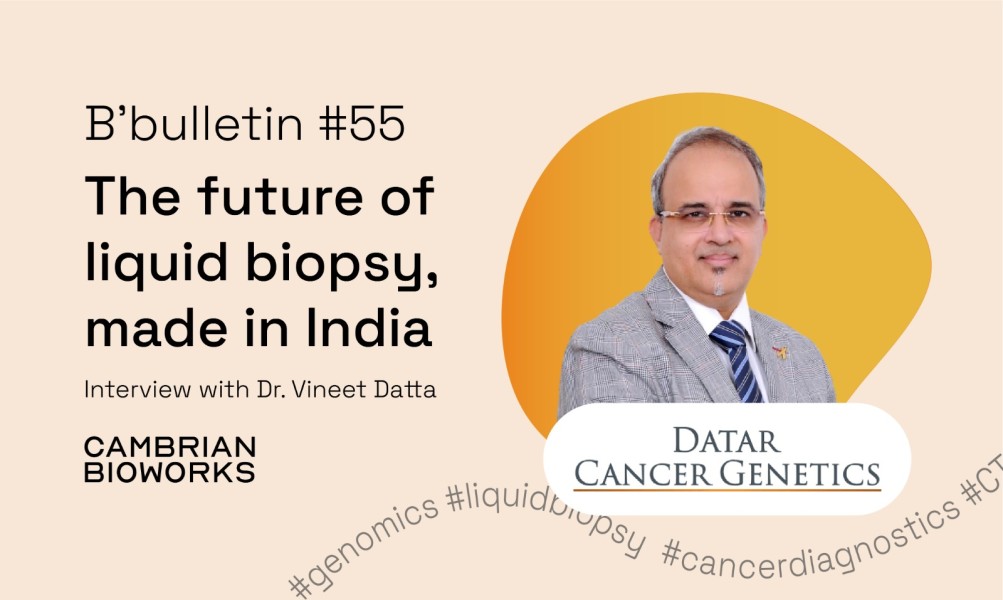In a world besieged by a myriad of health challenges, few adversaries strike fear into our hearts as profoundly as cancer does. Like an invisible assailant, it lurks in the shadows, stealthily infiltrating lives, families, and communities.
In 2022 alone, a staggering 10 million people died of cancer, globally.
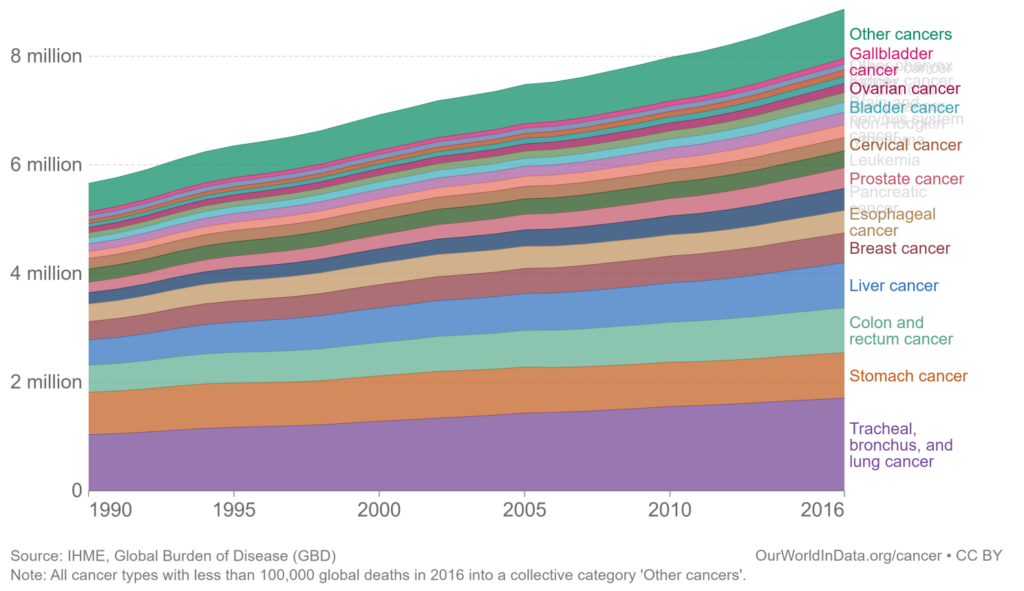
Cancer deaths by type. Image source: https://ourworldindata.org/cancer#the-number-of-cancer-deaths-is-increasing-as-the-world-population-is-growing-an
In the midst of this immense burden, a group of dedicated scientists dares to bring this silent killer into the spotlight, unveiling secrets and laying a foundation for a cancer-free future.
Datar Cancer Genetics Limited is one of the very few organizations across the world that provides innovative genomic solutions across the entirety of the cancer ecosystem from cancer detection to diagnosis to therapy selection, monitoring for treatment resistance, and tracking minimal residual disease.
Unlike conventional clinical laboratory workflows, which are narrow in scope and therefore incomplete, DCG’s approach provides a comprehensive picture of the gaps in cancer biology.
This is akin to assembling a jigsaw puzzle. Most clinical laboratories only use genomics to arrive at conclusions about a patient’s disease state. DCG employs a multi-omics approach that assembles the entire puzzle based on these varied pieces of critical data. This multi-dimensional approach is a powerful enabler for clinicians.
DCG doesn’t just examine the DNA, but also considers tumor selectivity and uses various analytes as ancillary puzzle pieces. Depending on the tumor, these bio-analytes like DNA, RNA, and cell fragments are released in the circulation and are present in plasma.
While researching and developing advanced tools for isolating cell-free DNA, we discovered Datar’s impressive work in India. They are a flag-bearer in this new approach to cancer care,
said Rohit Asil, Co-founder of Cambrian Bioworks, a Bangalore-based manufacturer of kits for the extraction of high-quality nucleic acids for molecular assays.
“Liquid biopsies” provide a non-invasive approach to tumor molecular profiling without having to obtain tumor tissue. Clinicians today increasingly use the blood drawn from a patient’s arm to analyze tumor fragments that are typically shed into the bloodstream. This provides a better treatment guidance plan.
Genomics is a Game Changer in Cancer Care
Today, the promise of truly personalized medicine is no more a distant dream. New treatments such as checkpoint inhibitors and other immunotherapies are rapidly increasing the range of treatment options that clinicians can access.
But, before administering, it is essential to conduct advanced testing to match patients with the exact treatments that will work for them.
Every individual’s cancer possesses unique characteristics in terms of its sensitivity to different therapies. The examination of tumors typically relies on biopsies, which involve extracting small samples of cells from the tumor for analysis. However, biopsies may only capture a fraction of tumor cells that are not representative of the entire tumor. This can lead to overlooking effective therapies if specific indicators are missed. Conversely, the wrong drug may be selected if the biopsy reveals the presence of an indicator that is not actually prevalent in the tumor.
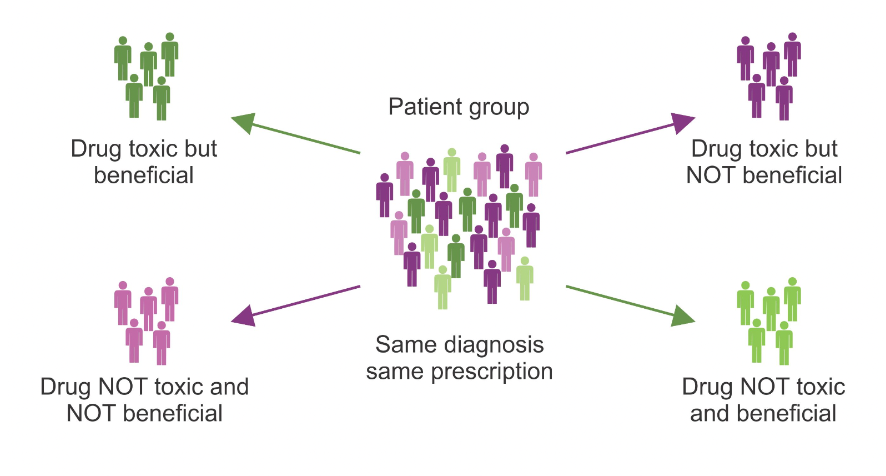
Image source: genetichealing.in
This is where sequencing and other molecular assays have been transformative to oncology.
Datar Cancer Genetics has championed the widespread adoption of genomics to help further our understanding of cancer. This growth in genomics testing infrastructure has seen the rise of companies such as Cambrian Bioworks in the development and manufacture of world-class reagents, consumables, and test kits to support precision testing.
Solutions and Technology Offered by Datar Cancer Genetics
For Screening and Diagnosis:
Screening tests examine early indicators of cancer in individuals without apparent symptoms. This drastically improves 5-year survival rates, but also mitigates treatment expenses, while contributing to improved care experience.
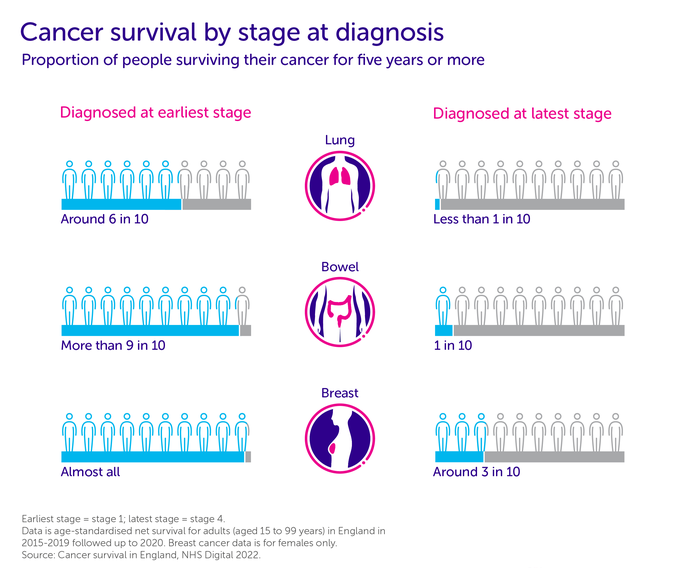
Image source: https://www.cancerresearchuk.org/about-cancer/cancer-symptoms/why-is-early-diagnosis-important
High mortality rates associated with cancer primarily stem from the spread of cancer cells to distant sites in the body, a process known as metastasis. This incorporates various stages, including tumor cells infiltrating the bloodstream alongside the growth of new blood vessels (neovascularization), overcoming the forces within the circulatory system, exiting the bloodstream to invade a new environment, and ultimately establishing a secondary tumor mass.
Considering that dissemination transpires through the circulatory system, investigating the biology of circulating tumor cells (CTCs) can offer valuable insights into the molecular mechanisms behind metastasis.
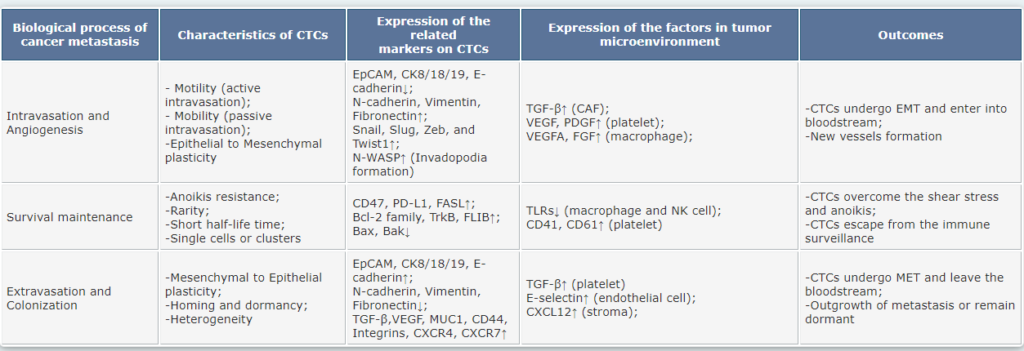
Mechanisms of how CTCs participate in cancer metastasis. Image source: https://www.ijbs.com/v18p3251.htm
Datar Cancer Genetics revolutionizes cancer screening with its blood-based test. It detects Circulating Tumor Cells (CTCs) in 70+ solid tumors covering tumor subtypes and markers specific to other cancer types such as glioma, sarcoma, and neuroendocrine tumors. The technology itself has been validated on more than 40,000 individuals over the past years and enables a higher sensitivity to detect and capture CTCs in an efficient enrichment process. Evaluation of the expression profile of cellular markers allows clinicians to determine information about the organ where the disease originated. This process employs a broad and highly specific panel of antibodies for CTC detection and organ localization, hence, analysis of these unique combinations allows the evaluation of multiple organs simultaneously.
Cancers release intact, malignant tumor cells in the blood, which are responsible for the spread of the cancer. As these cells originate from the cancer, their detection via a blood sample allows evidence of the underlying cancer. Methods that have been used so far had a very low sensitivity, whereas our innovative processes employ a novel process to enrich and profile these types of cells,
said Dr Vineet Datta, Director at Datar Cancer Genetics in an interview with Cambrian Bioworks.
For Therapy Guidance:
The conventional ‘standard of care’ approach does not take into consideration the overall genetic architecture of a patient‘s tumor.
In 2019, a qualitative study was conducted to explore cancer treatment workflows from 25 experts in the field. Cancer treatment workflows encompass a range of options provided to patients, including surgical treatment, radiotherapy, and comprehensive approaches such as chemotherapy, hormone therapy, and novel drugs.
Consider breast cancer. The treatment options for breast cancer are customized based on the specific subtype, stage, and individual patient factors. Below is an overview of the available treatment options for various subtypes of breast cancer. A multidisciplinary team of healthcare professionals develops the treatment plan to provide the most optimal treatment option for patients.
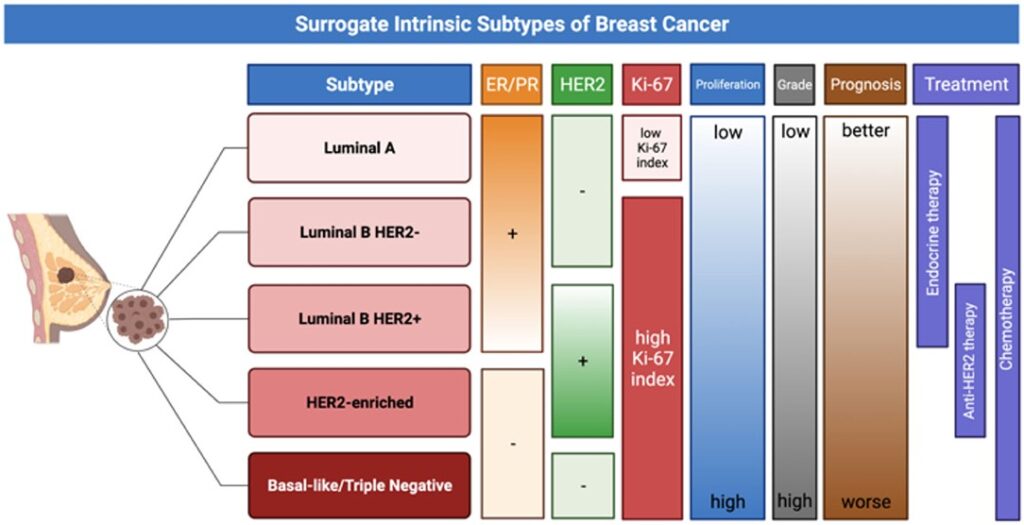
Image source: https://www.frontiersin.org/articles/10.3389/fmed.2022.881551/full
But treatments still fail in some patients. Even if a patient is ER+, there are mutations that render the standard treatment ineffective.
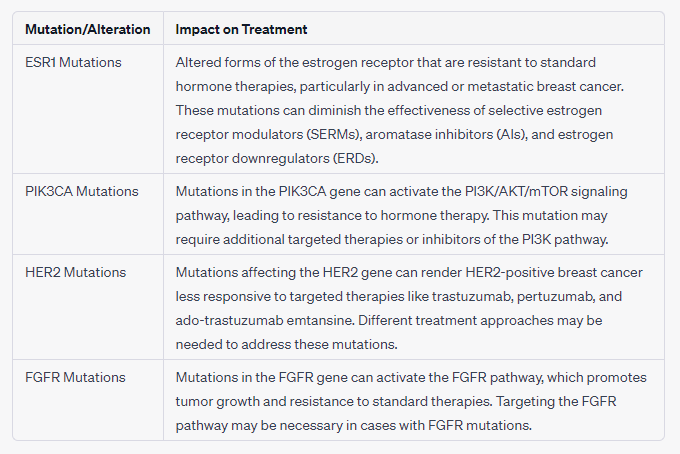
Image source: ChatGPT
According to the American Cancer Society, the five-year relative survival rate for distant metastatic breast cancer is 30 percent.
According to Dr. Andy Gaya, Consultant Clinical Oncologist at The Cromwell Hospital, London
“The dynamic transformation of the oncology space is accelerating, as new technologies become better understood, easier to use and less expensive. The proportion of patients receiving genetic tests is on the rise as more data points enumerate the benefits of such technologies. Aside from providing better insights to clinicians about the biology and aggressiveness of cancer, the benefit of repeat genetic tests is `personalized targeted therapy’ for every cancer”.
“Circulating tumor DNA, circulating tumor cells and tumor-related exosomes may offer new opportunities to provide insights into the biological and clinical characteristics of a cancer. They represent alternative routes for diagnostic and prognostic purposes, and for choosing therapies, predicting and longitudinally monitoring response to treatment and disease progression”, says Andy Gaya.
A comprehensive treatment plan is imperative for a thorough examination of the tumor’s molecular characteristics, enabling a deeper comprehension of its genetic makeup and guiding precise treatment choices.
DCG provides an advanced tumor gene expression analysis that delves into the intricate details of the cancer genome.
With a multi-analyte and multi-coordinate approach, the interrogation of over 20,000 genes provides a comprehensive insight into cancer biology. The analysis includes the examination of targeted genes for single nucleotide variations (SNVs), copy number variations (CNVs), gene amplifications, immunocytochemical markers, and a wide range of other analytes. This empowers the development of sophisticated and personalized treatments, even for challenging-to-treat or late-stage cancers. This holds the potential to improve outcomes, particularly in cases where conventional approaches may be less effective.
Here is a case study of a 22-year-old female with stage IV Triple-negative breast cancer (TNBC) – a rare type of breast cancer. It had progressed following 5 lines of therapy. But, after the administration of therapies recommended by DCG, the patient’s cancer showed remarkable regression.
For Monitoring Treatment:
Each patient’s cancer exhibits a distinct genomic landscape, often comprised of genetically diverse subclones that evolve dynamically throughout the disease progression. The possibility of cancer recurrence after treatment can be a daunting prospect. There are various reasons for this occurrence:
- Inadequate eradication: Initial treatment may fail to eliminate all cancer cells, allowing the remaining cells to proliferate and form new tumors.
- Metastasis: Certain cancer cells can spread to different parts of the body and establish secondary tumors.
Intratumor heterogeneity presents a challenge as a single biopsy may not capture the complete and evolving tumor landscape, providing only a snapshot of the disease at a specific moment.
To address this, DCG provides solutions that closely monitor the progression or regression of tumor characteristics. By analyzing molecular features in circulating tumor DNA, circulating tumor RNA, and circulating tumor cells (CTCs), real-time and responsive insights into the ever-changing molecular profile of a patient’s cancer can be obtained. This enables timely interventions and personalized treatment approaches tailored to the individual’s unique cancer situation.
Dr Sidharth Sahni, Director of Breast Services, at Fortis Cancer Institute, says, “What we see in lymph node-negative patients, at the time of surgery, if you use a cell-free DNA as a tracking tool for sensing, if there is any residual disease or not, it’s a fabulous method. The current staging and management situation is done by CT. The cell-free DNA as a tool is much more sensitive and there is a fabulous correlation between the two. It may be too short an interval to judge the overall survival, but we’re talking about a cohort where all hope had been lost in the previous paradigm.”
We Are Witnessing a Transformation in Healthcare
20 years ago, one of the most crucial projects in the scientific community – the Human Genome Project (HGP), was completed.
The Human Genome Project has fuelled the discovery of nearly 2,000 disease genes, and these are proving highly effective at providing fast and accurate analysis. They have been especially valuable in identifying rare genetic diseases that had previously eluded diagnosis for years, putting an end to the anguish of prolonged “diagnostic odysseys.”
Since then, the research community has made significant strides in mapping gene products (such as proteins, enzymes, and biomarkers). These advances in sequencing have culminated in a wealth of insights, reaching a critical mass of information about the human genome. Increasingly, clinicians are able to target therapies to patients in whom these are most likely to work.
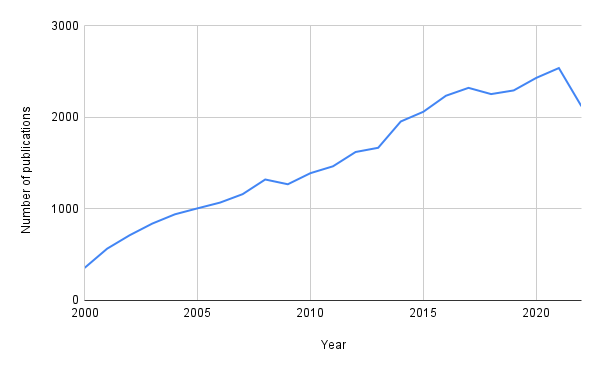
The number of papers cited about pharmacogenomics since 2000. Source content: https://pubmed.ncbi.nlm.nih.gov/?term=pharmacogenomics&timeline=expanded
From my experience, over the last couple of years, what we’ve seen is a foray into genomics driving the oncology market from the point of view of targeted treatment,
said Dr Vineet.
From the increasing clinical utility of immunotherapy, I see the strengthening of the genomic advocacy from various different analyte formats in the few coming months and years. I see an opportunity beyond just the standard exome analysis, which often provides more misses than hits for both the patient and the treating clinician. There’s already a lot of interest going into transcriptome analysis, and I foresee expanded utility of blood-based genomics across disease management and monitoring,
said Dr. Vineet.
From Theory to Practice
Understanding cancer is worlds away from effectively treating it. In the quest to bridge this gap, we sought expertise, and we again turned to Dr Sidharth Sahni and Andy Gaya.
We asked him how does he foresee the growing role of genomics in revolutionizing cancer detection in the future?
As per Dr. Sidharth, “With blood, cancer can be detected even months before a mammogram or an MRI picks it up. Despite the advances made in mammography, the lesions do get missed.
There are ways to detect tumors and detect them early but consider the pelvis and then the central nervous system, how the hell are you going to use that till an event is precipitated?
I think the science is being built in and built up and I think very soon as you said, genomics will be used more and more”.
Q. How do you decide if a patient should undergo a before-genomic test to determine a better treatment option guided by expertise and advanced knowledge about the evolving science?
“High-risk patients, specifically those with a significant family history of cancer or those presenting with aggressive tumors, require special attention, according to Dr Sidharth. In recent times, we have been implementing a proactive approach by conducting upfront analysis to gain insights into the tumor’s characteristics. This approach is particularly valuable for patients experiencing recurrences, even during the first recurrence”.
Although the number of such cases is fortunately not as high, there are instances where patients have received prior treatments elsewhere and have experienced multiple lines of treatment failure. These patients are often desperate for answers, and it becomes crucial to understand the underlying reasons for treatment resistance or disease progression, even in cases of first-line therapy.
“In relation to the affordability, there are two things. If you’re insured, it’s not always covered by insurance. Number two, if you are, it still can be expensive. But that’s the chicken and egg situation that the costs are coming down and will do so further when the volume is tidal. Datar is on its journey of regulatory approvals and I see greater patient and clinical acceptance in the near future. Twenty years ago if somebody had told me that you’d have a telephone directory, your emails, every single correspondence in the back pocket of my trouser, I would have laughed in your face. It’s the same with genomics”, said Dr. Sidharth.
It’s not just entering the world of oncology, but genomics will impact pretty much every sphere of life as we know it.
According to Dr. Andy, “Colorectal and pancreatic cancers have huge unmet needs with an urgent requirement for new targeted therapies. These are slowly filtering through with specific KRAS G12C inhibitors, BRAF combination therapies, PARP inhibitors for those with BRCA mutations, and checkpoint inhibitors for patients with mismatch repair defects or microsatellite instability. These therapies cannot be selected without robust sequencing technologies. Datar offers a rapid, hi-tech, and cost-effective solution for longitudinal molecular profiling”.
Conclusion:
The oncology field is a fast-evolving space, igniting optimism for a future where cancer becomes increasingly manageable and curable. At the forefront of this transformation is the realm of genomics, offering unprecedented opportunities in personalized medicine. By delving into the intricate genetic makeup of tumors, we are presented with a profound ability to analyze distinct genetic mutations and alterations unique to each patient’s cancer. This empowers us to tailor treatments precisely to individual needs, promising enhanced treatment outcomes while mitigating the side effects associated with conventional therapies. We need to understand how more can we leverage the growing understanding of genomics to develop even more targeted and effective cancer treatments. And what other innovative approaches can we explore to better tackle the unique aspects of each individual’s cancer?
✍️Author:
Himani Arora, Scientific Communicator, Cambrian Bioworks
💼Advisors:
Dr Vineet Datta, Director, Datar Cancer Genetics
Dr Sidharth Sahni, Director of Breast Services, Fortis Cancer Institute
Andy Gaya, Consultant Clinical Oncologist, The Cromwell Hospital
Vaibhav Hegde, CEO, Cambrian Bioworks
Rohit Asil, Co-founder, Cambrian Bioworks

